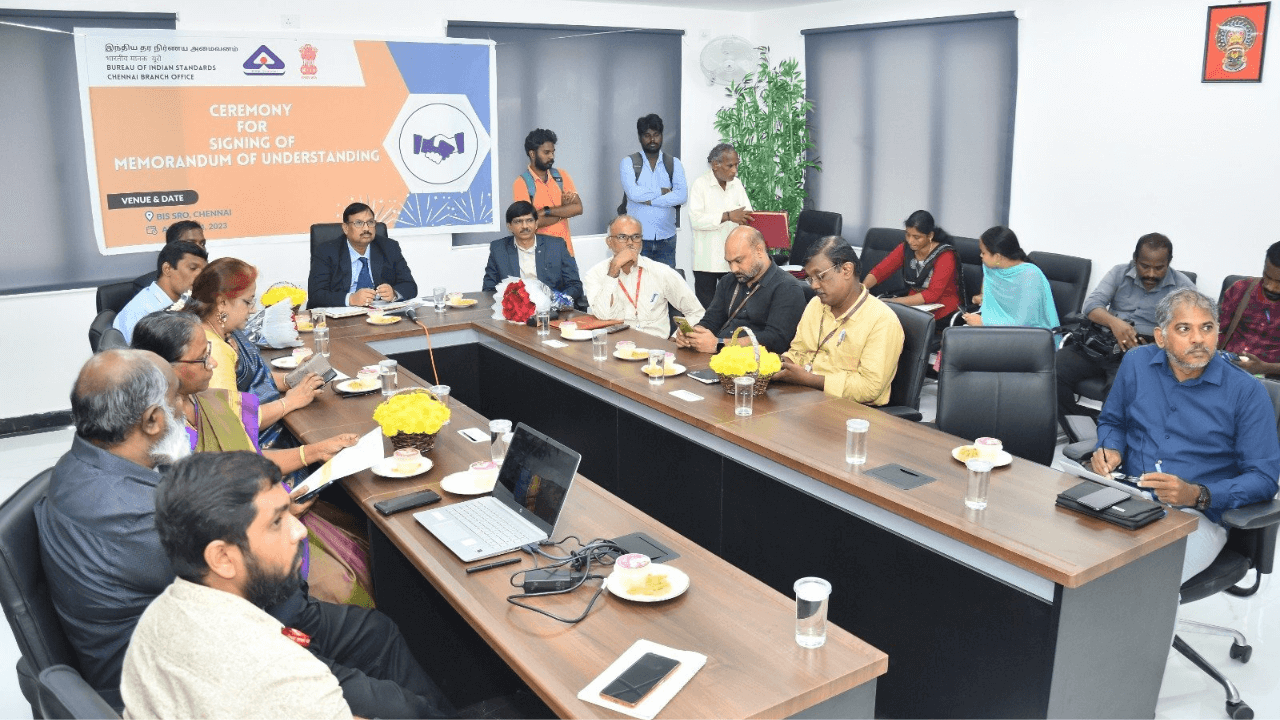The Bureau of Indian Standards (BIS), India’s National Standards Body, has entered into Memorandum of Understandings (MoUs) with 35 esteemed institutions spanning the nation. These collaborations are aimed at promoting cooperation in standardization and conformity assessment. The roster of institutions includes notable NITs, both Government and Private Engineering colleges, hailing from various states across the country.
More About the News
- The signed MoUs will open avenues for the collaborating institutions to engage in standardization endeavors.
- This involves their active involvement in the BIS’s technical committees on both national and international fronts.
- Additionally, they will benefit from infrastructure support for pertinent Research and Development (R&D) initiatives, mutual organization of events focusing on Standardization and Conformity Assessment, exchange of publications, integration of standardization curricula in academic programs, potential establishment of a Standardization and Conformity Assessment Center of Excellence, exploration of testing facilities, and the sharing of laboratory resources.
These MoUs mark a significant step toward enhancing and enriching the process of formulating standards through the valuable contributions of these esteemed academic institutions.
About The Bureau of Indian Standards (BIS)
The Bureau of Indian Standards (BIS) is the national standards body of India. It is responsible for the harmonious development of the activities of standardization, marking, and quality certification of goods and for matters connected therewith or incidental thereto. BIS was established in 1947 under the Bureau of Indian Standards Act, 1947.
The Bureau of Indian Standards (BIS) is a legally established organization operating under the Ministry of Consumer Affairs, Food and Public Distribution, Government of India. BIS carries out several initiatives including Product Certification (recognized by the ISI mark), Certification of Management Systems, Hall Marking for Gold and Silver Jewelry/Artifacts, and Laboratory Services. These endeavors are geared towards supporting and enhancing the industry’s operations, while also prioritizing the protection and welfare of consumers.
BIS has a wide range of functions
- Developing and publishing Indian Standards (IS). IS are technical specifications that set out the requirements for products, processes, and services. They are used to ensure the quality, safety, and performance of products and services.
- Implementing conformity assessment schemes. Conformity assessment schemes are used to verify that products and services meet the requirements of IS. BIS has a number of conformity assessment schemes, including product certification, system certification, and laboratory accreditation.
- Recognizing laboratories for conformity assessment. BIS recognizes laboratories that are capable of conducting conformity assessment tests and audits. This ensures that the results of conformity assessment tests and audits are reliable and accurate.
- Promoting the use of IS. BIS promotes the use of IS through a variety of activities, including training, awareness programs, and publications.
- Representing India in international standardization organizations. BIS is a member of a number of international standardization organizations, including the International Organization for Standardization (ISO) and the International Electrotechnical Commission (IEC). BIS represents India in these organizations and works to ensure that Indian interests are taken into account in the development of international standards.
BIS plays an important role in the Indian economy. It helps to ensure the quality, safety, and performance of products and services, which in turn helps to protect consumers and promote trade. BIS also helps to improve the competitiveness of the Indian industry by providing a framework for the development and implementation of standards.

Hello, I’m Aditi, the creative mind behind the words at Oliveboard. As a content writer specializing in state-level exams, my mission is to unravel the complexities of exam information, ensuring aspiring candidates find clarity and confidence. Having walked the path of an aspirant myself, I bring a unique perspective to my work, crafting accessible content on Exam Notifications, Admit Cards, and Results.
At Oliveboard, I play a crucial role in empowering candidates throughout their exam journey. My dedication lies in making the seemingly daunting process not only understandable but also rewarding. Join me as I break down barriers in exam preparation, providing timely insights and valuable resources. Let’s navigate the path to success together, one well-informed step at a time.
